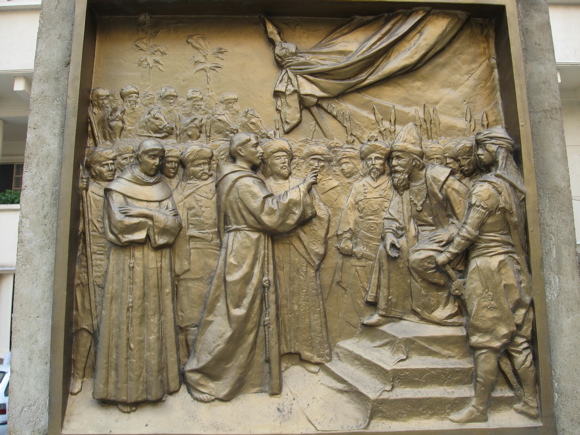 And the connection? Islamic Cairo, 800 years ago. My colleague Paul Moses, a religion writer and journalism professor, is set to publish a book about Francis of Assisi’s encounter with the sultan of Egypt, Malik al-Kamil, during the Fifth Crusade in 1219. As Paul writes at dotCommonweal, he has been reading Obama’s speech today in Cairo and the various reactions through that lens–but, as he says, it’s important not to overlook another audience for this address: We Americans:
And the connection? Islamic Cairo, 800 years ago. My colleague Paul Moses, a religion writer and journalism professor, is set to publish a book about Francis of Assisi’s encounter with the sultan of Egypt, Malik al-Kamil, during the Fifth Crusade in 1219. As Paul writes at dotCommonweal, he has been reading Obama’s speech today in Cairo and the various reactions through that lens–but, as he says, it’s important not to overlook another audience for this address: We Americans:
Obama faced much anger – but certainly not more so than Francis, who visited the sultan during a battle in which the Crusaders, having turned down a peace treaty that would have given them Jerusalem, were laying siege to the city of Damietta at the mouth of the Nile, slowly killing nearly all its 80,000 residents. Sultan al-Kamil, probably the most Christian-friendly of any Egyptian sultan, received Francis gently and allowed him to preach.
Francis came away with some revolutionary insights into how Christians could relate to Muslims. Even as the Crusade continued on toward its disastrous conclusion, he proposed that his friars live peacefully among Muslims and “be subject” to them. The tragedy is that Francis, ill and marginalized within his order during the last years of his life, was never able to convince others to join him in seeing Muslims in a new light. The example he tried to show his fellow Christians by going to the enemy unarmed wasn’t heeded at the time.
The response of Americans to Obama’s journey to Egypt is just as important as the reaction the president draws in the Middle East. The text of his speech shows that his remarks were addressed to Muslims. But the simple example of going to Cairo to speak to the Muslim world speaks volumes to Americans. It calls for a new way of relating to the Muslim world – that the default position shouldn’t be suspicion.
Obama was not just speaking to Muslims today. Much of the value of his journey will lay in whether it helps to change the attitudes of his own people.
Photo: “Francis and the Sultan,” Arnaldo Zocchi, 1909. St. Joseph’s Church, Cairo.
